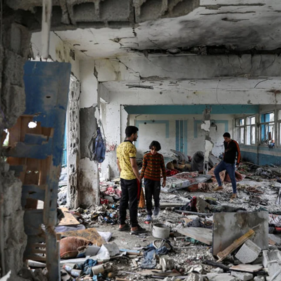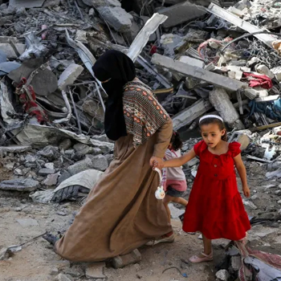Buying daily necessities for a few weeks or days can be a significant burden for low-income families due to escalating prices in the Grocery Store.
In our case, low-income people cannot afford beef or hilsha fish even once a year. The national fish is enjoyed by everyone during peak season. Md. Saddam, who works as a security guard at a garment factory in Dakshinkhan, Dhaka, said, “Despite saving money for months, we do not dare to buy hilsha for Tk700–800 per kg.”
By taking it upon himself, Shahadat Hossain Jewel has made the lives of his needy neighbors easier. Hilsha pieces cost Tk10 at Jewel’s shop, and packets of beef cost Tk10.
There is now an opportunity for me to buy meat, fish, and other items from Jewel’s shop and take any amount I need. If I have guests to feed, I don’t have to feel embarrassed,” Saddam said.
There’s a garment holiday going on. Patwari Grocery Store in Fayedabad, Dakshinkhan has been getting more customers since the morning. Oil, sugar, fish, meat, rice, and lentils are all available at this shop in the exact quantity that customers need.
A Patwari Grocery Store sells a variety of products, including sugar and salt for Tk1, puffed rice for Tk1, ginger, turmeric, or pepper for Tk2, tea leaves for Tk3, and cold drinks or cooking oil for Tk5.
I’ve been in the grocery business since 2007, and since then, I’ve offered my customers the option to buy as much as they need at my store,” said Jewel.
However, many people are shy and cannot ask for less than a certain amount because most shops in our country don’t sell daily necessities below a certain amount. Many people find it stressful to buy a lot of things with little money in their pockets, he explained.
Jewel said, “I see people going to the market for groceries but not having the money to buy fish. When they enter the fish market, they cannot buy groceries. That’s why people should be able to meet their daily needs with little money.”
Jewel’s family comes from Dakshinkhan. Initially, he conducted business at Gulshan with his father and elder brother. After completing his HSC, he initially thought he would settle in Australia. In fact, he even prepared for the IELTS test.

However, due to personal reasons, he abandoned that plan and opened a grocery store just outside his home instead. As a result of witnessing the financial suffering of people around him during the pandemic, he decided to sell products in small packs.
Patwari Grocery Store has used this arrangement for a few years, but a blogger’s video recently highlighted Jewel’s unique business model. As a result, people from many surrounding areas are now coming to see the shop.
In addition to purchasing necessary items, many express gratitude to the shopkeeper. In addition, Jewel’s business has grown, and he views it as a way to help humanity. Hanif Patwari, Jewel’s father, also lauds his son’s initiative.
Elderly Rasheda, who came to the shop with her grandson to buy Tk20 worth of oil, spoke highly of Jewel, saying, “Today, I have been a customer of Jewel’s shop for seven or eight years. No customer has to return empty-handed from here. Jewel offers many products that meet the needs of people; no other shop offers that. If you ask for ginger worth Tk10, no other shop will give you that. But Jewel will give you ginger for Tk5. I always tell him that you are doing good for people, and Allah will bless you.”
He had little money with him. Jewel recounted an incident before the pandemic: “One day a day laborer came to my shop at the end of the month. In spite of his shyness, he asked, “How much sugar do you sell at a time? And do you have powdered milk in small packets?”
Innovative Grocery Store Initiative Reduces Waste and Helps Customers in Need

The Grocery store didn’t have any Tk10-20 powdered milk packets available. I inquired about his requirements, and he explained that he only needed a small amount to feed his baby. I proceeded to provide him with sugar valued at Tk10 and opened a 200g packet of powdered milk, carefully measuring out Tk30 worth of milk. He also expressed a desire for palm candy, so I opened a half-kilogram packet and measured out Tk10 worth for him. With just Tk50, he was able to acquire enough food to sustain his child for three to four days. The man left the Grocery Store that day with a sense of gratitude, repeatedly expressing his thanks. This experience greatly boosted my motivation,” Jewel recounted.
He sells fish and meat by himself every morning. He keeps several types of fish in the shop, including Rui, tilapia, and panda, besides hilsha. In addition to beef, he plans to sell chicken.
When asked whether there is confusion regarding sales or profit, he said, “I calculate the profit on average. Different classes of customers come here. Not everyone takes sugar for Tk1 or oil for Tk5. Most of them buy in kilograms. If some of them buy a small amount, it is not much of a problem. If a company can make a profit by selling Tk1 candy, I can also make a profit by selling products for Tk1–2. Measuring and packing it separately is a bit time-consuming. But if you think of helping people, you can do anything. The will is mainly what is required.”
In response to a question about whether nearby shopkeepers are also enthusiastic about Jewel’s initiative, he said he hasn’t seen anyone take such an initiative. Shopkeepers nearby used to laugh at him at first. As he worked, he ignored them.
A grocery store near Jewel’s is Bismillah General Store. I can give the customer any size they need. But I don’t have the time to sell everything separately like Jewel Bhai.” said owner Farzana Bobby.
One day, Jewel hopes that such initiatives will be undertaken nationwide. By allowing people to buy as much as they need, waste can be reduced greatly.









